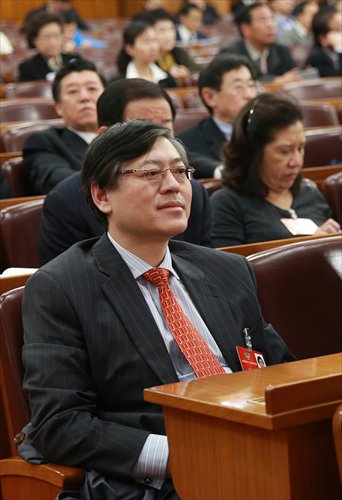China should make greater use of IT to tackle poverty

Lenovo CEO Yang Yuanqing Photo: Courtesy of Lenovo
Editor's Note:
China has been battling poverty for decades, and as part of its current efforts, the country is looking to IT as a growing source of help. The biggest advantage offered by the Internet is its capability to break the barriers of time and space to effectively and precisely match the needs of impoverished people with the supply of various resources, argued Yang Yuanqing (Yang), CEO of Lenovo Group and a member of the CPPCC National Committee in his written answers provided during the annual two sessions to questions submitted by the Global Times (GT). Yang also discussed some of the other key issues for the country's technology sector.
GT: Among your proposals to this year's two sessions, the incorporation of IT into the country's efforts to lift people out of poverty has drawn wide attention, stoking debate over the contribution of IT to the wider economy. How would you evaluate the level of China's incorporation of IT into its task of reducing poverty so far?
Yang: The country is not yet advanced in using IT to address poverty - which means gaining accurate and reliable data concerning demand among impoverished people. More efforts in this area could help allocate resources more precisely to where they are needed.
This is partly due to the fact that poverty-stricken regions in the country lag behind in terms of information infrastructure construction. As a result, the Internet penetration is much lower in these regions compared to other parts of the country, making it hard for information technology to play a part in relieving the issue.
In addition, there is no nationwide platform that could integrate all the existing platforms built by different provinces and cities to gather information related to poverty reduction. The country has yet to take a holistic approach to poverty reduction.
Therefore, integration of IT into poverty elimination needs more government policy support. For example, subsidies could be offered to telecom carriers to build broadband networks as part of the overall information technology infrastructure in poorer areas.
A nationwide online platform that could effectively distribute resources between the government, the market and society should also be established.
GT: What solutions have been offered to protect innovation while battling against knockoffs? Are there any key deficiencies in addressing this issue?
Yang: The country's 13th Five-Year Plan (2016-20) has put innovation at the core of development of the overall economy. To spur innovation, the government has announced a raft of regulations and policies, such as preferential tax treatment and also technological support.
However, the problem of knockoffs is still seen amid stiffer market competition, indicating that the country has yet to provide sufficient protection measures. Infringement of intellectual property rights (IPR) is still rampant, particularly in the arena of smartphones, computers and electronic products.
Failure to safeguard IPR dampens businesses' enthusiasm to pursue genuine innovation.
GT: Has the lack of effective IPR protection blurred the lines between innovative products and knockoffs?
Yang: The way I see it, true innovation remains clearly separated from copycat goods, although knockoffs are still seen in the domestic market. It is widely known that an entire counterfeit supply chain was discovered in Shenzhen's Huaqiangbei electronics market, through which an electronic device could be assembled in a few minutes looking roughly like a brand-name one. Take a look around and we'll see knockoffs almost everywhere, such as lookalike Apple products. Replica furniture has also been seen that was based on pictures of products displayed at the Milan Furniture Fair. Even fashion items and television programs have been cloned from the originals.
However, it is clear that only truly innovative products can stand the test of time and be genuinely welcomed by the market and consumers.
GT: What's your outlook for the PC sector as a whole, and what do you think of the efforts by some smartphone makers to enter the PC arena?
Yang: I've always been optimistic about the outlook for the PC sector. Admittedly, the industry has seen slowing growth, even contraction, over the past few quarters. This is partly because of macroeconomic uncertainty, especially the weakening of currencies in Europe and Latin America, which has weighed on the overall market demand. The rapid rise of smartphones in emerging markets has also dealt a blow to the PC market, with many consumers skipping PCs and being solely dependent on smartphones.
But the PC market is so gigantic, hitting $200 billion globally, that I strongly believe it will gradually get back on track. In the US, for example, the availability of smartphones only delays the purchase of new computers by local users, rather than killing demand for computers. China is expected to see the same trend, as PCs' more powerful functionality and larger screens will still be required to address diversified user needs. China's PC market is therefore set to grow bigger and see better prospects.
And while the PC market is being bad-mouthed by some market watchers, the fact that firms like Huawei and Xiaomi have taken vigorous steps to join it shows the PC market still has enormous potential. The new players' venture into the field will bring more attention to the PC sector, but this won't have a big impact on Lenovo, as the firm is not afraid to compete. It's the opposite. Only competition can result in better products and user experience, and this can revive the PC industry.
Read more in Special Coverage: